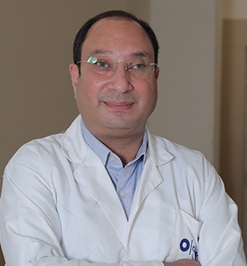Knee Replacement Surgery - Procedure, Benefits and Recovery
Dr. Aman Priya Khanna

Treatment Duration
60 Minutes
------ To ------90 Minutes
Treatment Cost
₹ 1,75,000
------ To ------₹ 6,90,000

Table of Contents
You can check Total Knee Replacement Cost here.
What is Total Knee Replacement Surgery (TKR)?
Knee Arthroplasty or Knee Replacement Surgery is a surgical procedure used to resurface a knee damaged by arthritis (tenderness and swelling of joints). The damaged portion of your knees is replaced with metal or plastic prosthetics. This surgery will help you with mobility and relief from pain.
Total Knee Replacement Videos by HexaHealth
Expert Doctors (10)
NABH Accredited Hospitals (10)
Total Knee Replacement Success Stories


What are the Benefits of Knee Joint Arthroplasty?
- Less risk of infection
- Quick recovery
- Relieves pain
- Helps in movement
Who needs Total Knee Replacement?
Knee replacement surgery is commonly performed in individuals between 60-80 years of age. This surgery is safe, effective and will help you move better and return to your daily activities.
- Osteoarthritis (joint degeneration) is the most common reason you might need a knee arthroplasty. Other conditions such as rheumatoid arthritis and post-traumatic arthritis following knee injury can also cause knee damage.
- Osteoarthritis causes damage to your cartilage, which results in problems such as:
- Reduced knee movements
- Pain
- Inability to perform daily activities (e.g., climbing stairs or walking).
- Pain while lying down or sitting.
You must consult a rheumatologist (a doctor who specialises in arthritis) if you have the following issues:
- Knee injury or arthritis that has damaged your joint.
- Severe pain, stiffness and swelling in your knees.
- Reduced knee movement.
- Difficulty in carrying out routine activities due to pain and stiffness in the joint.
- Swelling in your knee that does not get better after taking medications or rest.
- Earlier treatment options like physical therapy or medications are not helping.
- Apart from arthritis, you should also see your doctor if you have bow deformity or bowlegs (a condition where your knees are curved outwards).
If you wish to undergo knee replacement surgery, you should visit an orthopaedic surgeon (a doctor who diagnoses and treats the injuries and diseases of bones, muscles, joints, ligaments, and tendons). Depending on your symptoms and diagnosis, your surgeon will recommend knee replacement surgery or other treatment options.
What to Expect Before Surgery?
- Before undergoing knee arthroplasty, your orthopaedic surgeon will schedule an appointment with you for the following:
- Explain the knee replacement procedure. You should ask your surgeon if you have any concerns related to the surgery.
- Check your medical history and perform a physical examination, dental check-up, blood tests, and diagnostic tests (e.g., ECG). Your orthopaedic surgeon will conduct these tests to ensure that you are fit for surgery.
- Sign a consent that allows the surgeon to carry out the surgery.
- Your surgeon will recommend that you stop smoking and drinking alcohol. If you have smoking or drinking habits, inform your surgeon about the amount and duration of tobacco and alcohol consumption, as this can hamper your recovery process.
- Ask your family member or friend to live with you for one to two weeks post-surgery.
- The surgeon might suggest you keep shower chairs, toilet seat riser, firm chair with handles, and elevated bed with risers ready as they will be required after surgery.
What to Expect on the Day of Surgery?
When you reach the hospital on the day of surgery, the healthcare staff will guide you through the further process of surgery.[1] You will experience the following before surgery:
- If you have hair on your knee, the healthcare staff will remove them.
- If you are allowed to take medications, you should take them with a sip of water.
Risks & Complications After TKR Surgery
- Immediate Complications
- Bleeding from the surgical site.
- Injury to nerves, ligaments, and blood vessels.
- Numbness or weakness in your knee area.
- Delayed Complications
- Persistent pain and stiffness at the surgical site.
- Pain in your calf, foot, or ankle that is new and gets worse.
- Infection can have the following signs:
- High body temperature.
- Bleeding or drainage at the surgical site.
- Swelling at the surgical site.
- Chest pain.
- Shortness of breath.
- Loosening of the prosthetics.
- Fractures.
- Blood clots in your lungs or legs.
Consult your operating surgeon if you experience any of the above changes.
What to Expect During Surgery?
- During the knee replacement surgery, you can expect the following:
- You will remain under general anaesthesia or spinal anaesthesia during the surgery.
- You will be kept in a supine position (lying on your back) with your knee flex to 90° during the surgery.
- Your anaesthesiologist will stay with you in the operating room to continuously monitor your vitals like blood pressure, blood oxygen level, breathing, and heart rate.
- If you have a partial or unilateral knee replacement, your surgeon will mark the side of your knee for surgery. If you have a total or bilateral knee replacement, your surgeon will mark both the knees and replace them.
What is Recovery and Post Op. after Total Knee Replacement?
You can expect the following:
At hospital
- Once your vitals (breathing, blood pressure, and pulse rate) are stable, the healthcare staff will shift you to the intensive care unit for one night. On the next day of the surgery, you will be moved to the general hospital room.
- You will have a tube attached to your surgery site to drain the blood collected during the surgery.
- You will meet your physiotherapist for the following:
- Plan an exercise program to begin movements and strengthen your new joint.
- Use a continuous passive machine that will help move your new joint while you are in bed.
- Suggest some exercises for moving your new joint at home.
- Suggest a walker that will help you walk until your balance is improved.
- Your legs may remain swollen, and you may feel discomfort while performing the exercise, which is entirely normal.
- Knee replacement surgery is an in-patient surgery, which means you need to stay in the hospital for three to five days post-surgery.
- You will get discharged once you are fit to go home. During your discharge process, the healthcare staff will give you home-care instructions and follow-up dates.
- The healthcare staff will continually change the dressing during your hospital stay until the wound at your surgical site is healed.
- You will be able to stand (by taking the help of someone) within 24 hours after undergoing knee replacement surgery.
At home
Medications:
- You will experience pain post-surgery while moving your joint. For this, your treating doctor (ortho specialist) will suggest a painkiller.
- You might receive aspirin for preventing blood clot formation after surgery. However, do not consume aspirin if not recommended by your surgeon. Aspirin can increase the chances of bleeding.
- You might be recommended anti-inflammatory (painkillers) medicines to reduce swelling.
Recovery:
- Keep your surgical site dry.
- Bath as per the instructions given by your surgeon.
- You will have some swelling at the surgical site. To reduce this swelling, apply an ice pack to your surgical site or elevate your limb.
- The swelling and pain due to surgery will take nearly three months to reduce.
- Complete recovery after the surgery will take around six months if all precautions are taken and instructions are followed. Rarely, you might take more than six months to move or walk without pain or difficulty. So, you should take the following precautions in your daily life:
- Do not drive unless allowed by your ortho specialist. You can start driving six to eight weeks post-surgery.
- Avoid falling.
- Avoid climbing stairs unless allowed by your surgeon.
- Use handrails while climbing stairs or in the shower.
- Use a chair while bathing.
- Use a walking aid for six weeks post-surgery.
- Do not cross your legs for the first six weeks.
- Wear supportive shoes while going out.
- Sit on a stable chair that has two arms, a firm seat, and a footstool. Do not sit on a reclining chair.
- You can perform light chores during the first three months after surgery; however, avoid standing for long periods or bending down.
- You can resume going for your work six to 12 weeks after surgery.
- A knee prosthetic or implant can function very well for 15 years. This means you will be able to function smoothly for 15 years post-surgery.
- If you were young while undergoing knee replacement surgery, you might need a second surgery in later years.
- To increase the life of your prosthetic knee, you will need to avoid certain activities like jogging, running, basketball, tennis, contact sports, or exhaustive labour work. You can replace these activities with walking, hiking, cycling, dancing, swimming, water aerobics, and labour work which does not include heavy lifting.
Support:
- Exercise or knee movements will be an important part of your life after knee replacement surgery. Exercise will increase the success of the surgery. Hence, your surgeon will suggest you continue your physical therapy post-discharge from the hospital.
- Physical therapy will help regain your muscle strength and increase your knee movements.
First Follow up Appointment?
- You will have a follow-up 10 to 14 days post-surgery.
- During the follow-up, your surgeon will remove the surgical stitches or staples.
Total Knee Replacement Cost Videos
More Treatment options
Last Updated on: 23 March 2024
Reviewer

Dr. Aman Priya Khanna
MBBS, DNB General Surgery, Fellowship in Minimal Access Surgery, FIAGES
14 Years Experience
Dr Aman Priya Khanna is a well-known General Surgeon, Proctologist and Bariatric Surgeon currently associated with HealthFort Clinic, Health First Multispecialty Clinic in Delhi. He has 14 years of experience in General Surgery, Proctolo...View More
Author

With over 5 years of experience in content writing, SEO, marketing, branding, social media, and copywriting, she creates persuasive content that drives results. For the past 3 years, she has focused on medical cont...View More
Total Knee Replacement in Top Cities
Total Knee Replacement Cost in Top Cities
Latest Health Articles








































